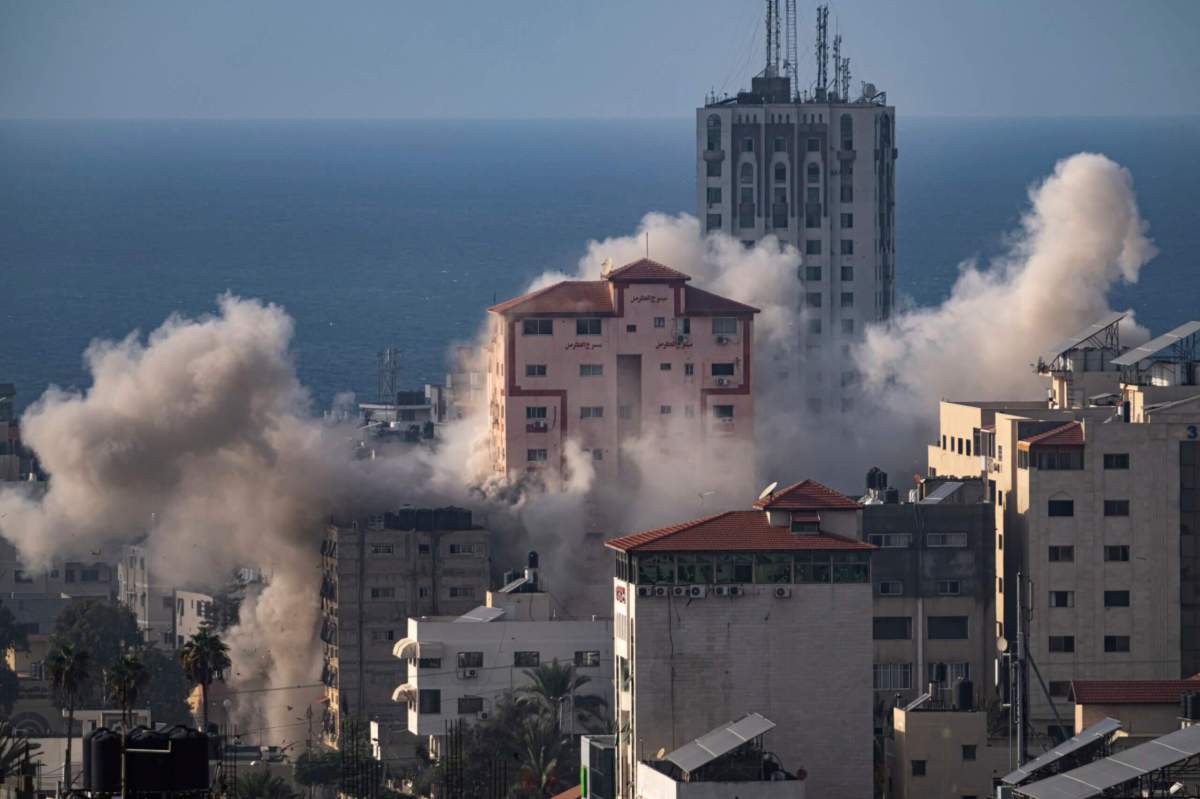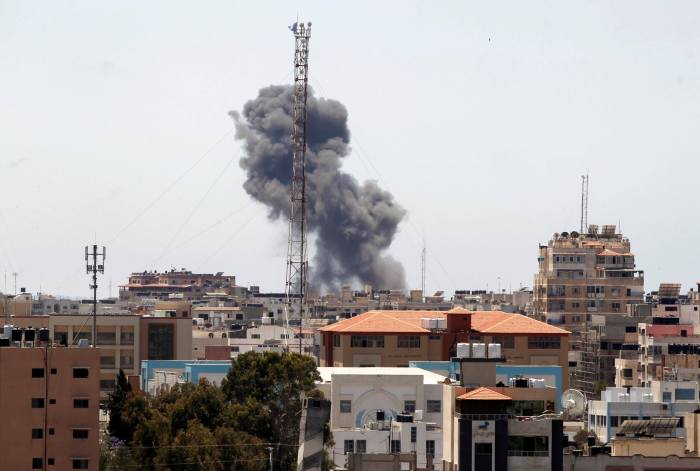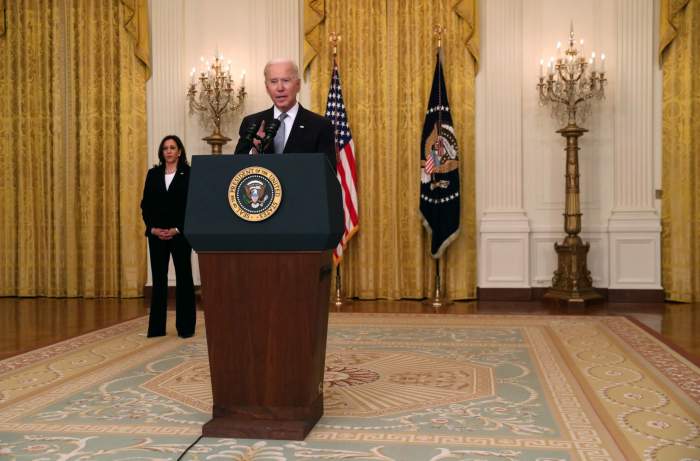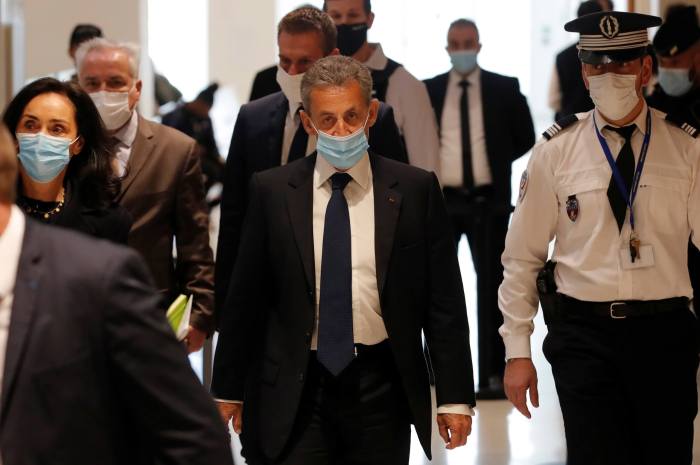Israeli Prime Minister Benjamin Netanyahu and a leading opposition figure on Wednesday created a war-time Cabinet overseeing the fight to avenge a stunning weekend attack by Hamas militants. In the sealed-off Gaza Strip ruled by Hamas, Palestinian suffering mounted as Israeli bombardment demolished neighborhoods and the territory’s only power plant ran out of fuel.
The new war-time Cabinet establishes a degree of unity after years of bitterly divisive politics, and as the Israeli military appears increasingly likely to launch a ground offensive into Gaza.
The Cabinet, which will focus only on issues of war, will consist of Netanyahu, Benny Gantz — a senior opposition figure and former defense minister — and current Defense Minister Yoav Gallant, a statement released by Gantz said.
The government is under intense public pressure to topple Hamas after its militants stormed through a border fence Saturday and massacred hundreds of Israelis in their homes, on the streets and at an outdoor music festival. Militants in Gaza are holding an estimated 150 people taken hostage from Israel — soldiers, men, women, children and older adults.
Still, Israel’s political divisions remain. The country’s chief opposition leader, Yair Lapid, was invited to join to new Cabinet but did not immediately respond to the offer. It appeared that the rest of Netanyahu’s existing government partners, a collection of far-right and ultra-Orthodox parties, would remain in place to handle non-war issues.
A ground offensive in the tiny, coastal Gaza Strip, densely populated with 2.3 million people, is likely to dramatically hike casualties in a war that has already claimed at least 2,200 lives on both sides.
So far, Israel has unleashed an increasingly destructive bombardment in Gaza that has flattened entire city blocks and left unknown numbers of bodies beneath mounds of debris. Militants in Gaza continued to fire rockets at Israel on Wednesday, including a heavy barrage at the southern town of Ashkelon.
Some 250,000 people have fled their homes in Gaza — more than a tenth of the population — most crowding into U.N. schools. Others crowded into a shrinking number of safe neighborhoods in the strip of land only 40 kilometers (25 miles) long, wedged among Israel, Egypt and the Mediterranean Sea.
After the attack by Hamas, Israel halted the entry of food, water, fuel and medicine into the territory. The sole remaining access from Egypt was shut down Tuesday after airstrikes hit near the border crossing.
Gaza’s only power plant shut down Wednesday afternoon after running out of fuel, the Energy Ministry said. That leaves only private generators to power homes, hospitals and other facilities. With no fuel able to enter, those were on a ticking clock until individual stocks of diesel run out.
The Gaza Strip’s biggest hospital, Al-Shifa, only has enough fuel to keep power on for three days, said Matthias Kannes, a Gaza-based official for Doctors Without Borders. The group said the two hospitals it runs in Gaza were running out of surgical equipment, antibiotics, fuel and other supplies. “We consumed three weeks worth of emergency stock in three days,” Kannes said.
The Palestinian Red Crescent said other hospitals’ generators will run out in five days. Residential buildings, unable to store as much diesel, likely will go dark sooner.
Egypt and international groups have been calling for humanitarian corridors to get aid into Gaza. Convoys stood loaded with fuel and food Wednesday on the Egyptian side of the Rafah crossing, but were unable to enter Gaza, an Egyptian security official said, speaking on condition of anonymity because he was not authorized to talk to the press.
Meanwhile, exchanges of fire over Israel’s northern borders with militants in Lebanon and Syria pointed to the risk of an expanded regional conflict.
U.S. President Joe Biden on Tuesday warned other countries and armed groups against entering the war. The U.S. is already rushing munitions and military equipment to Israel and has deployed a carrier strike group to the eastern Mediterranean as deterrence.
On Wednesday, the Lebanese militant group Hezbollah fired anti-tank missiles at an Israeli military position and claimed to have killed and wounded troops. The Israeli military confirmed the attack but did not comment on possible casualties. The Israeli army shelled the area in southern Lebanon where the attack was launched.
In the West Bank, Israeli settlers attacked a village south of Nablus, opening fire on Palestinians and killing three, the West Bank-based Palestinian Health Ministry said.
It has mobilized 360,000 reservists, massed additional forces near the territory and evacuated tens of thousands of Israeli residents from communities nearby.
Toppling Hamas, which has ruled Gaza since 2007, would likely require prolonged ground fighting and reoccupying Gaza, at least temporarily. Even then, Hamas has a long history of operating as an underground insurgency in areas controlled by Israel.
Hamas said it launched its attack because Palestinians’ suffering has become intolerable under unending Israeli military occupation and increasing settlements in the West Bank and a 16-year-long blockade in Gaza.
But the shock, grief and demands for vengeance against Hamas among Israelis have brought a new ferocity after past conflicts with Hamas that saw heavy bombardments of Gaza but ended with the group still in power.
In a new tactic, Israel is warning civilians to evacuate whole Gaza neighborhoods, rather than just individual buildings, then levelling large swaths in waves of airstrikes.
Israel’s tone has changed as well. In past conflicts, military spokesmen repeatedly insisted on the precision of strikes in Gaza, trying to ward of criticism over civilian deaths. This time, military briefings emphasize the destruction being wreaked. They say targeted neighborhoods broadly are being used by Hamas, but rarely give specifics to justify strikes as they did in earlier wars.
“We will not allow a reality in which Israeli children are murdered,” Defense Minister Gallant said in a meeting with soldiers near the southern border on Tuesday. “I have removed every restriction — we will eliminate anyone who fights us, and use every measure at our disposal.”
The military tells residents to evacuate neighborhoods about to be struck, and tens of thousands flee. But Palestinians say some are unable to escape or have nowhere to go, and that entire families have been crushed under rubble.
Other times, strikes come with no warning at all, survivors say.
“They directly targeted our house, and there was no warning or anything,” said Hashem Abu Manea, 58, who lost his 15-year-old daughter, Joanna, when a strike late Tuesday leveled his home in Gaza City. “We were sitting there as civilians, dressed like anyone else.”
The Hamas-run Interior Ministry said Israeli airstrikes destroyed the entire al-Karama neighborhood in Gaza City, with a “large number” of people killed or wounded. It said medical teams were unable to reach the area because all roads to it were destroyed.
Rescue officials say they have struggled to enter other areas as well. At least four Red Crescent paramedics have been killed in strikes, the organization said.
Israeli airstrikes late Tuesday struck the family house of Mohammed Deif, the shadowy leader of Hamas’ military wing, killing his father, brother and at least two other relatives in the southern town of Khan Younis, senior Hamas official Bassem Naim told The Associated Press. Deif has never been seen in public and his whereabouts are unknown.
On Wednesday, waves of rockets rained down on the Israeli city of Ashkelon, with shrapnel slamming into the street. Israel’s Iron Dome missile defense system intercepted at least one overhead. Tuesday night, Israeli troops stopped an incursion by militants into Ashkelon, killing three, the military said.
The Israeli military said more than 1,200 people, including 155 soldiers, have been killed in Israel, a staggering toll unseen since the 1973 war with Egypt and Syria that lasted weeks. In Gaza, 1,055 people have been killed, according to authorities there. In the West Bank and east Jerusalem, at least 17 Palestinians have been killed by Israeli police during clashes with stonethrowers. Thousands have been wounded on both sides.
Israel says roughly 1,500 Hamas militants were killed inside Israeli territory and contends that hundreds of the dead inside Gaza are Hamas members.



















